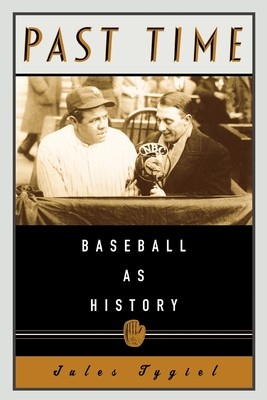
- We will send in 10–14 business days.
- Author: Jules Tygiel
- Publisher: Oxford University Press, USA
- ISBN-10: 0195146042
- ISBN-13: 9780195146042
- Format: 15.6 x 23.4 x 1.6 cm, minkšti viršeliai
- Language: English
- SAVE -10% with code: EXTRA
Reviews
Description
Few writers know more about baseball's role in American life than Jules Tygiel. In Baseball's Great Experiment: Jackie Robinson and His Legacy, Tygiel penned a classic work, a landmark book that towers above most writing about the sport. Now he ranges across the last century and a half in an intriguing look at baseball as history, and history as reflected in baseball.
In Past Time, Tygiel gives us a seat behind home plate, where we catch the ongoing interplay of baseball and American society. We begin in New York in the 1850s, where pre-Civil War nationalism shaped the emergence of a "national pastime." We witness the true birth of modern baseball with the development of its elaborate statistics--the brainchild of English-born reformer, Henry Chadwick. Chadwick, Tygiel writes, created the sport's "historical essence" and even imparted a moral dimension to the game with his concepts of "errors" and "unearned" runs. Tygiel offers equally insightful looks at the role of rags-to-riches player-owners in the formation of the upstart American League and he describes the complex struggle to establish African-American baseball in a segregated world. He also examines baseball during the Great Depression (when Branch Rickey and Larry MacPhail saved the game by perfecting the farm system, night baseball, and radio broadcasts), the ironies of Bobby Thomson'simmortal "shot heard 'round the world," the rapid relocation of franchises in the 1950s and 1960s, and the emergence of rotisserie leagues and fantasy camps in the 1980s. In Past Time, Jules Tygiel provides baseball history with a difference. Instead of a pitch-by-pitch account of great games, in this groundbreaking book, the field is American history and baseball itself is the star.
EXTRA 10 % discount with code: EXTRA
The promotion ends in 22d.11:56:36
The discount code is valid when purchasing from 10 €. Discounts do not stack.
- Author: Jules Tygiel
- Publisher: Oxford University Press, USA
- ISBN-10: 0195146042
- ISBN-13: 9780195146042
- Format: 15.6 x 23.4 x 1.6 cm, minkšti viršeliai
- Language: English English
Few writers know more about baseball's role in American life than Jules Tygiel. In Baseball's Great Experiment: Jackie Robinson and His Legacy, Tygiel penned a classic work, a landmark book that towers above most writing about the sport. Now he ranges across the last century and a half in an intriguing look at baseball as history, and history as reflected in baseball.
In Past Time, Tygiel gives us a seat behind home plate, where we catch the ongoing interplay of baseball and American society. We begin in New York in the 1850s, where pre-Civil War nationalism shaped the emergence of a "national pastime." We witness the true birth of modern baseball with the development of its elaborate statistics--the brainchild of English-born reformer, Henry Chadwick. Chadwick, Tygiel writes, created the sport's "historical essence" and even imparted a moral dimension to the game with his concepts of "errors" and "unearned" runs. Tygiel offers equally insightful looks at the role of rags-to-riches player-owners in the formation of the upstart American League and he describes the complex struggle to establish African-American baseball in a segregated world. He also examines baseball during the Great Depression (when Branch Rickey and Larry MacPhail saved the game by perfecting the farm system, night baseball, and radio broadcasts), the ironies of Bobby Thomson'simmortal "shot heard 'round the world," the rapid relocation of franchises in the 1950s and 1960s, and the emergence of rotisserie leagues and fantasy camps in the 1980s. In Past Time, Jules Tygiel provides baseball history with a difference. Instead of a pitch-by-pitch account of great games, in this groundbreaking book, the field is American history and baseball itself is the star.


Reviews